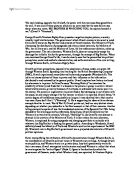But in this novel Orwell showed his scorn for many socialist intellectuals, whom he described as so bemused by 'the myth of Soviet power' and Marxist ideology that they had lost their traditional care for freedom and had failed to understand the nature of working people. The book was at both times a look at why socialism was a solution to the problems in Wigan, but a criticism and sharp critique of the type of socialism that most English were believers of. He blamed them for the reason that socialism had failed to ever get popular support. It was these left-wing intellectuals who were more interested in theory than reality that were damaging the concept of socialism. The general idea of Orwell is that socialism and communism are no longer movements of the working class. This movement is lead by the middle-class. The Socialists who make propaganda for their movement generally don't even have a lot of contact with the class they are "fighting for". The only contact with working-class that socialists generally have is only with the lower-class intelligentsia at the divers politic workshops.
That there is an inherent disconnect between the classes is another problem. Orwell explains the way a typical member of his class sees the other layers of society. Middle class children were taught that the lower classes smelt: less as a result of their living conditions or manual work, it was simply inherent to their breeding. It was fashionable, says Orwell, to talk about this prejudice disappearing. Indeed it is fashionable to talk about that today. Social mobility is one of the givens of our age. Accidents of birth and race are less of a barrier to what an individual can achieve than they used to be. At least, so we are lead to believe. The need to believe this illusion lies in our unease with class divisions. It is easier to pretend that they do not exist. So there is no progress.
Orwell’s experiences lead him to believe that the unemployed will remain unemployed, and that there is never any hope of them being able to improve their conditions. He observed that the re-education programs of the time had all failed and that they would continue to fail. Capitalism, he believed, had created this problem and would continue to make it worse. Since the competition of capitalism would not be able to re-employ these men, he believed that co-operation through socialism would be able to provide a better way of life for these people.
Orwell also saw the world splitting into political factions: fascism and socialism. Fascism, to Orwell, was a danger because it enslaved the workers. He saw socialism as allowing the workers liberty and freedom. It alarmed Orwell that fascism was spreading so quickly and feeding off of class distinctions and nationalism. To Orwell, the only answer to fascism was socialism. Capitalism, in his opinion, would never fight against fascism because it would not be profitable.
Orwell saw the deeply entrenched class distinctions of England as a threat to socialism. He believed, however, that the once the workers and the oppressed middle class once realised that they were in the same lot they would work together to implement socialism. This spirit of co-operation would eventually destroy all class boundaries.
Orwell defended socialism because he believed that capitalism was the cause of the worker’s problems but could never solve these problems and because he was afraid that fascism would spread into England and enslave its working class. Orwell judged socialism not by those who were currently supporting it, but by what it was in theory. He concluded that this was the only choice that man had if he wanted to continue living free.
While I do certainly see Orwell’s point that socialism, as he sees it, will alleviate the ills such as the ones found in Wigan by actually beginning to care about the social well being of other humans. But what I feel he glosses over is some of the things that can result from socialism. Although he does express a great deal of disgust for totalitarianism and other fascist notions, he doesn’t seem to fully realize that running a socialist system inherently leaves itself open for exploitation and oppression from a singular totalitarian source. This could result in an even direr situation for the working class as well as now lowering the living standards and freedom of the rest of the country too. It just seems like the idea that everyone can work together for the benefit of everyone without the desire for personal achievement, power and the desire to be in control seeping into the mind of a lot of people is silly. I think that democratic socialism is a bit naïve in it’s nature.
But Orwell is right about the class separation in the UK as a contributing factor to the non-caring attitude they seem to have to all the people in Wigan and other Wigan-like communities. Lower classes are looked at as filthy animals and dirt seems to be a big preoccupation of the view of the working class. Orwell does try to cut into that with a lengthy discussion on the rigorous process the coal miners have to go through to get clean, trying to help fight certain prejudices and beliefs. Certainly Orwell seemed to care about what happened and present a situation where he thought it could work. Part of that plan was to question many of the beliefs of socialism at the time and to question the direction of the movement in an attempt to bring real debate and reform into the socialist movement. Then socialism would be equipped to help the working class, and the working class would be accepting of it. The only problem I see is that I don’t view socialism as a viable, real world remedy to the ills of Wigan.







